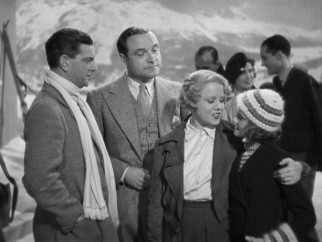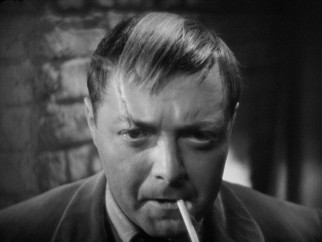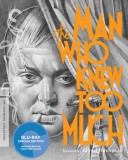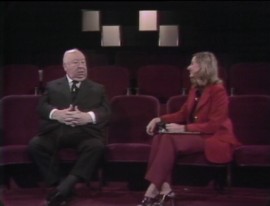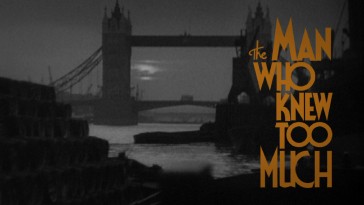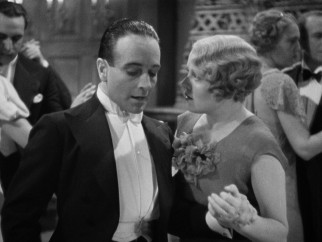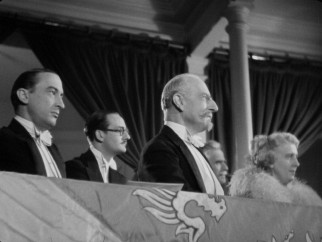The Man Who Knew Too Much (1934): The Criterion Collection Blu-ray Review
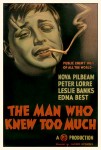 |
The Man Who Knew Too Much
US Theatrical Release: March 22, 1935 / Running Time: 76 Minutes / Rating: Not Rated Director: Alfred Hitchcock / Writers: Charles Bennett, D. B. Wyndham-Lewis (screenplay); Edwin Greenwood, A. R. Rawlinson (scenario); Emlyn Williams (additional dialogue) Cast: Leslie Banks (Bob Lawrence), Edna Best (Jill Lawrence), Peter Lorre (Abbott), Frank Vosper (Ramon), Hugh Wakefield (Clive), Nova Pilbeam (Betty Lawrence), Pierre Fresnay (Louis Bernard), Cicely Oates (Nurse Agnes), D.A. Clarke Smith (Police Inspector Binstead), George Curzon (Gibson), Henry Oscar (George Barbor the Dentist) |
Buy The Man Who Knew Too Much from Amazon.com: Criterion Blu-ray Criterion DVD
Just three of Alfred Hitchcock's many films can be considered remakes. The best known of those is The Man Who Knew Too Much, which found Hitchcock remaking himself. It's not too surprising that the remake, a color film released in 1956 and starring Jimmy Stewart and Doris Day, is the better known version. What is unusual is that it is also one of the few remakes considered superior to its predecessor. The original The Man Who Knew Too Much was released in 1934, a little more than halfway into Hitchcock's initial phase of directing films in his native England and just five years after Hitch had entered the sound era with Blackmail, the first all-talkie British film. Since Universal, Warner, MGM/Fox, and Paramount appear quite pleased with the unusual, enduring popularity of the Hitchcock films in their catalog, The Criterion Collection has found it easier to admit the director's earlier and less revered work into their hallowed line of prestige cinema. Next week, the original Man becomes only the third Hitchcock film with a Criterion DVD and Blu-ray remaining in print. The other two -- fellow British black & white productions The 39 Steps and The Lady Vanishes -- were among Criterion's earliest DVD releases. Man, on the other hand, is a completely new entry to the series, claiming Spine #643.
The film opens with the Lawrences, a British family, vacationing in Switzerland. Mother Jill (Edna Best), father Bob (Leslie Banks), and their daughter Betty (Nova Pilbeam) are having fun with shooting contests, dances, and ski slope playfulness. Things get serious, though, when a new friend (Pierre Fresnay) is assassinated and slips the mother some important information before dying. That exchange has the killers turn their attention to the Lawrences. They abduct young Betty and vow to kill her if the police become involved. Thus, Bob and a friend take it upon themselves to follow leads and both try to track down the missing girl and prevent the apparent assassination the dying spy warned of. Their efforts bring them to the congregation of a cult of brainwashing sun worshippers. The film culminates with a shootout in which the lead villain (Peter Lorre) and his associates unload countless bullets while holed up in a house.
A bad Hitchcock film is hard to come by, with most of his movies qualifying as good, great or excellent. Sure, you can find some ho-hum ones (e.g. Torn Curtain) and you'll probably encounter at least one you do not like (for me, Frenzy). But the vast majority offer something of interest, managing to arrest and excite with exquisite craft and sharp storytelling. I won't go so far as to say that the original The Man Who Knew Too Much is a bad movie, but it is certainly a disappointing one, made by someone who had not yet mastered the suspense thriller.
The film's most glaring problem is its lack of coherency. That's something you take for granted in most films and certainly from someone whose name carries the clout of Hitchcock. But while you probably know the general plot going in and certain details are clearly revealed (like insert shots of hand-written notes, which per the era give you more than enough time to read them), characters, motivations, and developments are not always or even often easy to keep up on. Hitchcock's signature films are celebrated as thrill rides full of twists, turns, scares, and exhilaration. This movie has hints of those elements, but it is too choppy and easily questioned to have any of them pay off. In his first English language role, the skunk-haired, baby-faced Lorre has unmistakable screen presence. His distinctive looks would help him enjoy a distinguished career in American film that would include appearances in such classic films as The Maltese Falcon, Casablanca, Arsenic and Old Lace, and Walt Disney's 20,000 Leagues Under the Sea. He is the character and actor who most stand out and you only wish he loomed as largely as his cover/poster-occupying visage suggests.
Even so, a compelling villain can't overcome structural confusion, technical limitations, and tastes of absurdity, as in the scene of chair-flinging in the church.
VIDEO and AUDIO As a public domain title, The Man Who Knew Too Much has seen a wide range of home video releases, many of them underwhelming in presentation. As expected, Criterion's Blu-ray transfer is far from it. The 1.33:1 picture is terrific, boasting tremendous clarity considering the film's age and British origins. The uncompressed 1.0 LPCM monaural soundtrack is also quite satisfactory. The recordings are clearly aged, but they remain intelligible even without consulting the English subtitles offered.
BONUS FEATURES, MENUS, PACKAGING and DESIGN The extras begin with an audio commentary by film historian Philip Kemp recorded for this release last year. The utterly well-researched Kemp is full of information regarding this production and Hitchcock's career at large. He touches on such topics as script revisions, censor objections, Hitch's brief alleged cameo, and comparing this film to its remake. On the video side, where everything is presented in high definition, we start "Guillermo Del Toro on The Man Who Knew Too Much" (17:40), a new interview of the accomplished Pan's Labyrinth, Hellboy film director and 1990 Hitchcock biographer. He discusses the film and how it fits into Hitchcock's career. The highlight among the bonus features is "The Illustrated Hitchcock" (49:48), a terrific two-part 1972 television program on the director. In Part One, Hitchcock is interviewed by Pia Lindstrom, daughter of actress Ingrid Bergman, about Method actors, the challenges of working with Charles Laughton, and his earlier films. Then, Part II has film historian and NYU professor William K. Everson ask Hitch about his even earlier films, focusing on Man and other British works. Both halves are compelling conversations with one of cinema's greats near the end of his career. "Hitchcock and Truffaut" (22:56) gives us the relevant excerpts of director Franηois Truffaut's historic 50-hour audio interview of Hitchcock with Helen G. Scott translating. Hitch tells the influential French New Wave auteur about the original The Man Who Knew Too Much, also touching upon its remake.
Finally, the restoration demonstration "The Film That Warped Too Much" (5:12) shows us just how long and dramatic Criterion's efforts were to make the film look its very best. The main menu plays an excerpt of the climactic opera over a 16:9 montage of slowed-down clips. This being a Criterion disc, it supports bookmarks and has no trouble resuming playback. The highlight inside the clear keepcase, which utilizes double-sided artwork, is a 20-page booklet, which includes the usual cast, disc, and transfer information along with "Wish You Were Here", a nice 7-page essay by film blogger Farran Smith Nehme that celebrates the film while putting it in the context of the international careers of Hitchcock and Lorre.
CLOSING THOUGHTS The 1950s Man Who Knew Too Much may not be one of Hitchcock's very best, but it's considerably more enjoyable than the rough 1930s thriller it remade. Hitch's early films have not held up as well as his later ones, which are both more technically polished and more dramatically sophisticated. The original Man Who Knew is really only saved by its creator. With any other director in the helm, it'd be long forgotten and not making its Blu-ray debut via Criterion. While Criterion gives the film a suitable, if somewhat slight, Blu-ray Disc, this release is to be of greatest interest to Hitchcock completists and devout Criterion collectors. Both would be better served by Criterion's other two Hitchcock BDs, not to mention the many other fine Hitchcock thrillers given tasteful treatment outside the line. Buy The Man Who Knew Too Much from Amazon.com: Blu-ray DVD Instant Video
|
Related Reviews:
DVDizzy.com | DVD and Blu-ray Reviews | New and Upcoming DVD & Blu-ray Schedule | Upcoming Cover Art | Search This Site
Directed by Alfred Hitchcock: The 39 Steps The Lady Vanishes Rebecca To Catch a Thief North by Northwest
Night Train to Munich Island of Lost Souls Wings The Stranger Vintage Mickey Scarface (1932) Hugo
New: Stolen Following Francis Ford Coppola: 5-Film Collection Looper Hitchcock Frankenweenie
